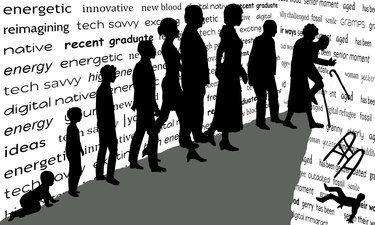From the editor: Our March of Progress through life should not end in mere oblivion
Years ago, in what seems now to be another lifetime, when I taught literature courses, I would ask my university students to look for le donné — the given. Those were the parts of a society, of a particular time and place, that found their way into a text without the author consciously putting them there.
Those societal norms are much easier to see and identify from a distance. When we are living amongst them, they often don’t register.
It took the murder of George Foyd in 2020, for example, to awaken many people to the systemic nature of racism. Because of it, our school district in Guilderland made changes to its curricula and more. Many of our police departments, based on the governor’s call for evaluation and reform, made changes as well.
I had an awakening myself this week — on ageism. I’m 71 but had blithely brushed off comments and attitudes that I can now see are indicative of ageism.
This new view was brought about by Deb Riitano, commissioner of Albany County’s Department for Aging. I had talked to her before about various programs her department runs for the elderly among us.
But what stuck with me were comments she made when I interviewed her for Louis Ismay’s obituary.
An educator, lifelong advocate for social justice, and champion of environmental causes, Ismay died in 2021 at the age of 96.
Riitano described him as “a great mentor.” She went on, “To say he was an old hippie wouldn’t cover it; I’m an old hippie.”
“We made Lou the Senior of the Year,” she said, recognizing his voluminous volunteer work. “He didn’t want a win-lose situation. He wanted a win-win for everyone,” she said.
At age 95, he asked Riitano for a job and she urged him to write for a newsletter she was launching about “what being a senior means and how important it is to stay connected and involved.”
“He never lost that sense of inquiry, that power to take in what was happening …,” Riitano said. “His body began to fail him — betray him — but his mind never did …. He just always displayed grace and style. His humanity was big.”
I had that example of a stellar old age in mind as I listened to what Riitano had to say at a news conference last week, launching a county initiative called Together Against Ageism.
Riitano was assembling a needs assessment to develop a four-year plan for her department.
She had typical questions, asking if those being surveyed were worried about staying in their homes or going to a nursing home, or if they were worried about getting food.
She incidentally threw in a question she hadn’t asked before: Are you concerned about ageism?
“That one question had a hit — a 90 percent response rate of, ‘Yes, I’m worried about ageism.’”
Riitano was off and running.
She has teamed up with Dina Refki, a clinical professor at the University at Albany and director of the Center for Women in Government and Civil Society, who will analyze research and practices that have proven effective in reducing ageism.
A variety of focus groups, made up of old people living in Albany County, will look at the ageism they’ve experienced so interventions can be adopted.
This is personal for Riitano and she is pursuing it with passion.
“I’m 75,” she announced at the press conference held at the Green Island Senior Center. “And yes, I have had people say things to me like, ‘You’re over the hill,’ ‘You want to retire?’
“No,” she responded emphatically.
Riitano recalled giving birth to her sixth child at age 41, which the medical profession terms a geriatric pregnancy. “This is not funny,” she said.
She recounted the story of a county resident recently taking her husband to see a specialist for a medical problem. The resident was concerned when the doctor’s response was, “You’re getting old.”
Riitano added, “By the way, older adults are not included in clinical trials.”
Both Riitano and Refki noted the media attention on aging in the current presidential election.
The county initiative, Refki said, “aims to get fresh evidence based on interventions that combat ageism in Albany County. We would like to address prejudices, normalization of myths about aging, and how to combat stereotypes — and also address internalized ageism.”
People who are already marginalized — for instance, because of gender — are at a “double disadvantage when they age,” said Refki. “If you are a Black woman who is an older adult,” she said, “you experience that triple oppression or triple disadvantage.”
The first phase will involve setting up a steering committee of old county residents to “guide the study from its inception to the publication,” Refki said, “and to adopt the interventions that we will identify.”
A thorough review of the research will be conducted and focus groups will be formed to “inform us about the extent and nature of the problem as experienced in Albany County,” the professor said.
“Then we will identify and create interventions adapted to the context of Albany County and implement policies to match, and also be evaluating those interventions,” said Refki.
The findings will take three or four months and designing the interventions will take another six months, she said.
Riitano said of the response to the ageism question in her department’s survey, “It was like an incidental finding … We were surprised to see that it got as big of a hit as it did, that so many people were concerned about it.”
Riitano wanted to ask the question about ageism because she had heard Tracey Gendron speak at the Albany Academy about her book, “Ageism Unmasked: Exploring Bias and How to End It.”
Ageism isn’t new. The term was coined in 1969 by Robert Neil Butler, the founding director of the National Institute on Aging. Its history of course predates the term describing it by centuries.
The first chapter of Gendron’s book looks at the ancient Greek society and the Middle Ages, which viewed old age as decrepitude and idolized youth while part of the Judeo-Christian Bible as well as the Hindu Dharmasastras, Islam, and Confucianism revere the elderly.
Gendron’s book, though, focuses on the ill effects of ageism against the elderly in our current American society.
Her thesis is to view aging not as a single stage but rather as a series of processes that can include growth at the same time as decline, that involve opportunities as well as challenges — much as Lou Ismay was described by Riitano. He had wisdom to share through his writing as a senior although his body was in decline.
While advances in medicine and technology have allowed us to live longer, Gendron writes, at the same time we elders are often perceived as a burden to society, segregated if we are thought unable to lead independent lives.
She argues, too, that ageism became rampant during the COVID-19 pandemic, which deepened isolation.
Retirement as a social institution, Gendron says, is now thought of as a developmental stage. A job is a ticket to society and, in retirement, elders are often thought to be in decline or lacking ability.
The anti-aging culture and consumer industry bring shame on elders and we are often negatively stereotyped. Gendron argues, too, that the digital age had caused an “othering” of elders.
The Older Americans Act of 1965, Gendron posits, does not protect elders as intended because it defines “all older persons as vulnerable and needy,” denying the heterogeneity of the segment of older persons and also further perpetuating stereotypes against them.
I’ve long been interested in stereotypes since our newspaper is also a print shop. A stereotype is a printing plate; it is used to duplicate the original — again and again and again, always the same. The term was coined at the end of the 18th Century from two Greek words: “typos” meaning impression, and “stereos” meaning firm.
It wasn’t until the 20th Century, though, that Walter Lippmann gave “stereotype” its modern meaning. In his book, “Public Opinion,” Lippmann wrote of the limitations people face in understanding their cultural and sociopolitical environments.
“The real environment is altogether too big, too complex, and too fleeting for direct acquaintance,” he wrote. People simplify by categorizing or stereotyping others; each person creates his or her own environment.
So, Lippmann wrote, people “live in the same world, but think and feel in different ones.”
Hence, seeing through stereotypes subjects us to partial truths.
The Nigerian writer Chinua Achebe put it powerfully and well: “The whole idea of a stereotype is to simplify,” he said. “Instead of going through the problem of all this great diversity — that it’s this or maybe that — you have just one large statement; it is this.”
I loved Achebe’s novel, “Things Fall Apart,” because of the way he described the lost Ibo culture; he made me see its complexities — its strengths and drawbacks — as the Christian missionaries were causing it to unravel.
It is only when we see the many layers that make up real people that we can know and love them. Such understanding is difficult to come by. It is far easier to stick with our own kind and to see others as stamped out, as if from a printing press.
Once we see them that way, as two-dimensional copies, rather than as flesh-and-blood originals, we’re just a step away from treating them as less than human, less than ourselves.
It is easy, as an old person, to absorb the given in our society, the partial truths, the stereotypes, and experience the discrimination and microaggressions as deserved.
That’s why the county’s initiative, and Refki’s research will be so valuable. It will create a starting point, a foundation, on which to build societal change.
Last week’s press conference opened with Michael McLaughlin, the county’s deputy executive, saying of age discrimination, “We don’t realize when we’re doing it.”
By way of example he described “maybe a grandmother” fallen on the sidewalk, looking like she may need help.
Assuming a falsetto tone, he asked, “Do you need some help, Sweetie? Honey?”
“That’s elderspeak … it’s patronizing,” said McLaughlin “It’s also ageism … In today’s society, all the rage is anti-aging, whether it be cosmetic products or wisecracking in birthday cards about getting older ….
“The American Psychological Association says ageism is one of the last socially accepted prejudices … Older adults right here in our area say that they experience negative attitudes, behaviors, practices at work and socially in everyday life.”
So, yes, a first step is awareness. Each of us can make an effort not to discriminate against others or, if we are old, against ourselves.
But the problem is larger than that. Like racism or sexism, it is systemic. Ageism is in all of our institutions: criminal justice, education, health care, and employment.
But, unlike racism or sexism, all of us who don’t die young will become old. Unlike someone who is born of a certain race or ethnicity or gender, each of us is aging every day in our own unique way.
According to the World Health Organization, the number of people aged 60 and over as a proportion of the global population will double from 11 percent in 2006 to 22 percent by 2050. By then, there will be more older people than children (aged 0 to 14 years) in the population for the first time in human history.
That should give us impetus to change the discriminatory systems that imprison our elders. Otherwise, any of us can one day be trapped by them.
Making these systemic changes would be, as Lou Ismay strove for, “a win-win for everyone.”
— Melissa Hale-Spencer, editor


